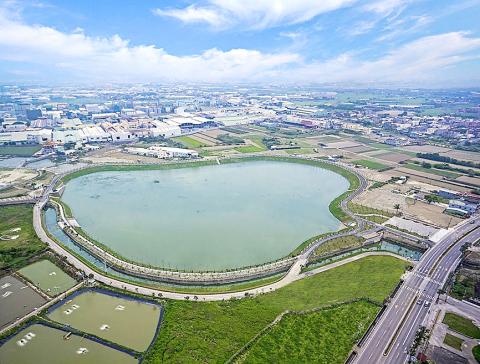Excess water from torrential rains on Thursday in Kaohsiung was quickly drained due to 15 retention basins built by the city government, I-Shou University Department of Mass Communication professor Hou Tsun-yao (侯尊堯) said on Friday.
Central and southern Taiwan have been battered by torrential rain since Thursday due to a tropical depression that has been moving slowly over that area, bringing gusty winds and torrential rain, which have caused travel and power disruptions, as well as flooding in Pingtung County, Chiayi County, Tainan and Kaohsiung, among other areas.
The Central Weather Bureau issued an “extremely torrential rain” alert for Yunlin, Chiayi, Tainan, Kaohsiung, Pingtung and Penghu, meaning it expected accumulated rainfall of 200mm over 24 hours or 100mm in three hours.

Photo: Hung Ting-hung, Taipei Times
Hou from 1995 to 2001 headed then-Kaohsiung County’s Planning and Control Office and doubled as head of the county Information Office. In those capacities, he was involved in hydroengineering efforts on all three major river systems in the area — those of the Love River (愛河), Houjin River (後勁溪) and Cianjhen River (前鎮溪).
Heavy rainfall due to extreme weather patterns is a problem that the US, Japan and many EU countries also face, Hou said, adding that the retention basins in Kaohsiung, while unable to prevent flooding, have reduced the flooded areas by 80 percent.
It is impossible to prevent local flooding following torrential rain, so hydroengineering efforts should be judged according to the rate of water drainage, not whether they prevent floods completely, he said, calling on Kaohsiung residents to maintain solidarity and unite in disaster relief efforts.
Politicians should not try to capitalize on the disaster and gloat over the misery of others, Hou said.
It is unacceptable if politicians try to use the events to gain an edge in the year-end local elections, he said.
Additional reporting by CNA

Taiwanese can file complaints with the Tourism Administration to report travel agencies if their activities caused termination of a person’s citizenship, Mainland Affairs Council Minister Chiu Chui-cheng (邱垂正) said yesterday, after a podcaster highlighted a case in which a person’s citizenship was canceled for receiving a single-use Chinese passport to enter Russia. The council is aware of incidents in which people who signed up through Chinese travel agencies for tours of Russia were told they could obtain Russian visas and fast-track border clearance, Chiu told reporters on the sidelines of an event in Taipei. However, the travel agencies actually applied

Japanese footwear brand Onitsuka Tiger today issued a public apology and said it has suspended an employee amid allegations that the staff member discriminated against a Vietnamese customer at its Taipei 101 store. Posting on the social media platform Threads yesterday, a user said that an employee at the store said that “those shoes are very expensive” when her friend, who is a migrant worker from Vietnam, asked for assistance. The employee then ignored her until she asked again, to which she replied: "We don't have a size 37." The post had amassed nearly 26,000 likes and 916 comments as of this

New measures aimed at making Taiwan more attractive to foreign professionals came into effect this month, the National Development Council said yesterday. Among the changes, international students at Taiwanese universities would be able to work in Taiwan without a work permit in the two years after they graduate, explainer materials provided by the council said. In addition, foreign nationals who graduated from one of the world’s top 200 universities within the past five years can also apply for a two-year open work permit. Previously, those graduates would have needed to apply for a work permit using point-based criteria or have a Taiwanese company

US President Donald Trump said "it’s up to" Chinese President Xi Jinping (習近平) what China does on Taiwan, but that he would be "very unhappy" with a change in the "status quo," the New York Times said in an interview published yesterday. Xi "considers it to be a part of China, and that’s up to him what he’s going to be doing," Trump told the newspaper on Wednesday. "But I’ve expressed to him that I would be very unhappy if he did that, and I don’t think he’ll do that," he added. "I hope he doesn’t do that." Trump made the comments in